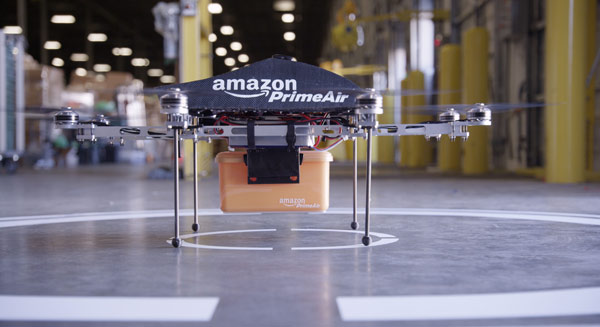Pie in the Sky?
Updated: 2015-02-27 10:28
By Christopher Davis(China Daily USA)
|
||||||||
 |
|
Amazon's experimental Prime Air robotic delivery system may run into a few snags thanks to new proposed rules from the FAA. Provided to China Daily |
Major US companies - along with China's e-commerce giant Alibaba - are in a race to deliver their products to customers' front doors, but the only thing holding them up could be regulations, CHRISTOPHER DAVIS reports from New York.
Google is testing them; so is Amazon, United Parcel Service and China's Alibaba.
They're flying robots, they navigate by themselves, they see things, they have intelligence, and, most important to those four companies, they carry things - make that deliver things - and Google, Amazon and UPS have ongoing private experiments in delivery by drone.
Google's tests are being carried out on the Australian Outback; its 5-foot-wide, single-wing drone has been delivering small packages of candy and cattle vaccines to two farmers in Queensland.
Google told The Wall Street Journal that it had been working on the project since 2011 and expected it would "take years to develop a service with multiple vehicles flying multiple deliveries per day".
Google's vehicle rises into the air helicopter-like and then once airborne, tilts into an airplane configuration and zips away.
In April 2014, Google acquired a maker of solar-powered drones—a startup that Facebook Inc had also considered acquiring. Google didn't disclose the purchase price for New Mexico-based Titan Aerospace, which is developing jet-sized drones that are intended to fly nonstop for years. Google said the technology could be used to collect images and offer online access to remote areas.
Amazon is experimenting with a 4-propeller arrangement that weighs 5 pounds and has about a 10-mile, 30-minute range from its warehouse base. Contacted for comment, Amazon Prime Air spokeswoman Kristen Kish made reference to the video of the drone at www.amazon.com/primeair.
Taking off
Earlier this month China's online retail giant Alibaba got into the game with a three-day drone delivery trial that had remote-controlled quadcopters - emblazoned with the Taobao logo - ferrying 12-ounce packages of ginger tea to 450 customers who lived within a one-hour flight of its distribution centers in Beijing, Shanghai and Guangzhou.
Alibaba CEO Jack Ma said that if the company hoped to reach its 2025 goal of 2 billion customers, it had to adopt methods used by Western tech giants.
The company hired well-known film director Wong Karwai to create an answer to Amazon Prime Air's demo tape that is now airing on Taobao's blog. It shows an unhappy woman ordering her ginger tea, then putting on a kettle of water on the stove to boil. By the time the water is ready, her tea is there and she is smiling.
The Tech in Asia blog, one of the first outlets to report the story of Alibaba's experiment, commended the operation. "Even though it's very limited in scope, Taobao is delivering real goods to real people, which is a step further than its Western counterpart Amazon has gone.
"That said, which company will actually roll out a fully functioning drone-based delivery service remains to be seen and is still a long way off," Tech in Asia wrote.
Alibaba is not the first China-based company to experiment with drone delivery. In 2013, InCake, a small bakery in Shanghai began delivering cakes to customers there using remote-controlled drones. That was halted by local authorities for operating without a license.
While flying drones as weapons continue to redefine the rules of military engagement, the private and commercial use of small unmanned aerial vehicles - UAVs - is creating a backwash of concern, speculation and wonder.
Will snoops be leering (and filming) from above? Will high-tech contraptions come crashing down on people? Will pizzas and textbooks really be delivered to doorsteps within minutes by whirling bots?
Aside from being just fun to fly, small UAVs, according to advocates, have the potential to transform an economy in a multitude of ways - from aiding precision agriculture and fast environmentally friendly deliveries to first responders and safe inspection of pipelines and cell towers.
"Drones hold the promise of companies anticipating our every need and delivering without human involvement," Tim Draper, an early investor in Hotmail, Skype and Baidu, wrote in an article entitled: Drones Delivering Pizza? Venture Capitalists Wager on It.
US airspace, he wrote, would soon be populated by drones, and venture capitalists were placing their bets. In the first nine months of 2013 when Draper's article appeared, VCs in the US had put more than $40 million into drone-related startups, more than double the amount for all of 2012. That same year, the US Congress instructed the Federal Aviation Administration to develop a plan for integrating drones weighing less than 55 pounds into US airspace by Sept 15, 2015.
Within the decade, one analyst predicted, sales of civilian drones would reach $8.2 billion and still be gaining altitude.

 Across America over the week (from Feb 20 to 26)
Across America over the week (from Feb 20 to 26)
 Phoenix landing
Phoenix landing
 Inside a Taobao village
Inside a Taobao village
 Testing mettle: Students appear for art college exam
Testing mettle: Students appear for art college exam
 Top 10 best-selling SUVs in Chinese mainland in 2014
Top 10 best-selling SUVs in Chinese mainland in 2014
 The eighth nine days: wild geese are flying back
The eighth nine days: wild geese are flying back
 China's biggest Akhal-Teke horse base
China's biggest Akhal-Teke horse base
 Chengdu citizens visit Du Fu Thatched Cottage to mark Human Day
Chengdu citizens visit Du Fu Thatched Cottage to mark Human Day
Most Viewed
Editor's Picks

|

|

|

|

|

|
Today's Top News
Tech firms cut from approval list
Yuan on move, but not to top
EB-5 could harbor fraud: report
US Representative requests Lunar New Year honors
Shanghai tops China's disposable income list
Hainan expands US non-stops
Google upbeat about reentering China: Forbes
China investors top US list of 2013 national security reviews
US Weekly

|

|







